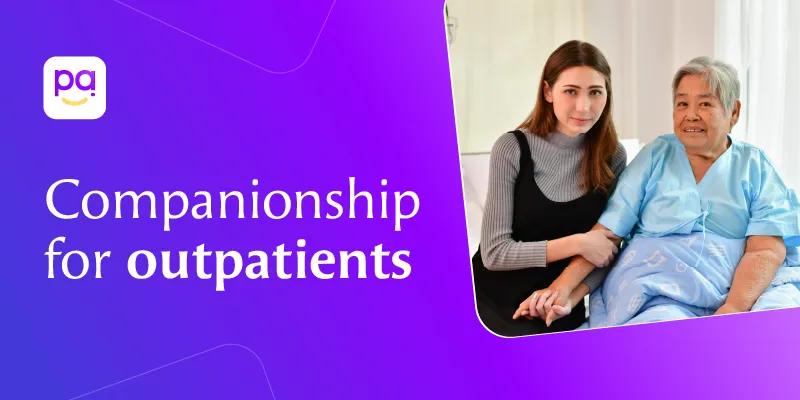COMPANIONSHIP FOR OUTPATIENTS
In This Article
COMPANIONSHIP FOR OUTPATIENTS
Pragati
Updated on September 28, 2024
Medically verified by
Fact checked by

General
5 min read
Outpatients are the one who receive medical care without being admitted for an overnight stay to a hospital or other healthcare facility. For diagnosis, treatment, or follow-up care, they go to the hospital or clinic, leave the same day, and go back home.
Various medical procedures, including consultations, minor surgeries, diagnostic testing, physical therapy, and more, can be included in outpatient services. Outpatient care is an essential component of the healthcare system. As it allows patients to continue with their normal activities and reduces the need for hospital beds. With its flexibility, comfort, and less aggressive approach to medical treatment, outpatient care is fast becoming the choice of many people. But when patients go through their rehabilitation away from the hospital, the importance of companionship and fostering both mental and physical health becomes clear.
Emotional Support and Mental Well-being by Pa
For many patients, moving from a hospital to an outpatient setting can be unsettling. Anxiety, depression, or loneliness might be brought on by an unexpected shift from an under observation, supportive setting to the comparative loneliness of one's own house. During this difficult time, PA companionship offers individuals the vital emotional support they need to overcome the psychological obstacles of recovery.
Adherence to Treatment Plans
Pa ensures that patients follow their recommended treatment programs which is one of the major issues in outpatient care. PA-companion ensures and pays attention to patient’s behavior regarding the condition and the situation, like follow-up appointments, or stick to suggested lifestyle modifications under the supervision of medical professionals. In this regard, we companions provide you with essential support and encouragement.
In addition, we accompany patients to appointments and help them arrange their medications, transportation and give physical assistance. This support lowers the chance of loneliness of the outpatients. Additionally, having a PA-companion might increase the patient's sense of accountability and encourage medication adherence.
Pa Enhancing Physical Recovery
Physical rehabilitation frequently involves everyday exercises that patients must perform on their own in addition to medical therapies. Support from our Pa companion can be helpful in allowing this part of healing. Pa Companions, for example, help with movement, making sure that patients get the appropriate exercise without going excessive. We also assist with transportation—tasks that might be difficult for someone suffering from illness or surgery. Furthermore, our companionship encourages patients to participate in physical activity that improves their health. To avoid issues like blood clots or muscle atrophy, we motivated our patients to stay active by going for a walk in the park or nearby.
In addition to offering physical support, having a Pa companion during the activities boost patient's sense of and capacity to take part in their rehabilitation.
Pa taking care of out patients
In outpatients care, one of the main worries is the possibility of the problems related to poor self care as it’s not easy for them to self monitor. Therefore, having a PA companion by your side will help you to cope up with the journey. We know the responsibility and we take care of the support you need throughout. Reaching us will make the patient’s life better and easier.
Pa - Fostering a Sense of Purpose and Connection
A sense of routine and purpose in life are also restored as part of the process of recovery, which goes beyond physical healing.
Thus, Pa offers immense healing by offering and engaging the patients socially and with the outside world. Our companion sees through different approaches according to the patient, like talking about everyday life or on a topic the patient is interested in, going out for a walk, etc. Therefore, this makes a big difference in a patient's quality of life while they heal.
Additionally, our companion can assist patients who may have neglected their interests, hobbies, or community activities while feeling sick in getting back. This sensation of engagement and connection can improve mood, lessen feelings of loneliness, and motivate patients to actively participate in their rehabilitation process.
 3 min read
3 min readHow Companionship Benefits the Elderly
 7 min read
7 min readCare For Your Family From Anywhere: Pa Companions Are Here For You
 7 min read
7 min readEmpowering Elders: The Role of Companionship
Get a Callback Now
The Role of Pa as Professional Caregivers
In addition to offering company, having a companion is an important part of outpatient treatment. Pa, provide and give our patients the emotional and social support they require in addition to medical aid.
We as Professional caregivers are qualified to manage both the psychological and emotional components of recovery.
Pa bridges the gap for patients who lack a strong personal support network by providing informed and supportive companionship. The patient and their loved ones might feel more at ease knowing that someone is watching over them and will provide assistance when needed, thanks to their presence.
Conclusion
In outpatient care, Pa companionship is an essential resource that provides advantages that go beyond the healing process. We have different positions in supporting our patients during their recovery journey, from promoting physical healing and lowering the risk of complications to offering emotional support and assuring respect to treatment protocols.
A sense of stability, purpose, and connection that is critical for successful outpatient care is promoted by our PA companionship, as it comes from the professional care of skilled caregivers.
Positive patient outcomes heavily depend on accepting and valuing the function of Pa companionship. In the end, having a companion beside the affected individual’s treatment improves the quality and recovery experiences.
Pa Companionship reduces anxiety and depression, promoting better mental and physical recovery.
Pa Companions help ensure patients stick to their treatment plans, reducing risks of complications.
Pa Companions assist with daily tasks and encourage physical activity, aiding overall recovery.
Social interaction and activities through our Pa- companionship enhance quality of life during recovery.
Pa, fill gaps of support and emotional care.
Our Pa Companionship addresses emotional, social needs, improving outpatient outcomes.
Source Links
Trusting Care
Honey Bee Home Care
Parx Home Health Care
National Council for Aging

